虚拟语气经典讲解
- 格式:ppt
- 大小:344.50 KB
- 文档页数:35

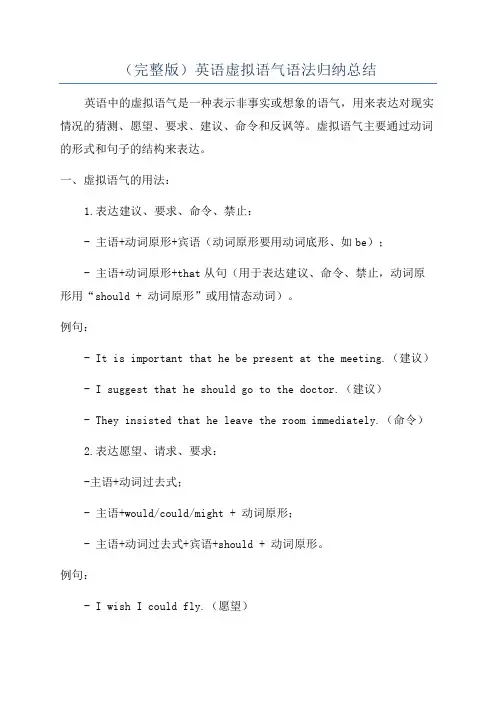
(完整版)英语虚拟语气语法归纳总结英语中的虚拟语气是一种表示非事实或想象的语气,用来表达对现实情况的猜测、愿望、要求、建议、命令和反讽等。
虚拟语气主要通过动词的形式和句子的结构来表达。
一、虚拟语气的用法:1.表达建议、要求、命令、禁止:- 主语+动词原形+宾语(动词原形要用动词底形、如be);- 主语+动词原形+that从句(用于表达建议、命令、禁止,动词原形用“should + 动词原形”或用情态动词)。
例句:- It is important that he be present at the meeting.(建议)- I suggest that he should go to the doctor.(建议)- They insisted that he leave the room immediately.(命令)2.表达愿望、请求、要求:-主语+动词过去式;- 主语+would/could/might + 动词原形;- 主语+动词过去式+宾语+should + 动词原形。
例句:- I wish I could fly.(愿望)- I would appreciate it if you could help me.(请求)3.表示虚拟条件:- If条件从句中的谓语动词用过去完成时,主句用would/should/might/could + have + 过去分词;- If条件从句中的谓语动词用过去时,主句用would/should/could + 动词原形。
例句:- If I had known his phone number, I would have called him.(虚拟条件)- If you had listened to me, we could have finished the project earlier.(虚拟条件)4.表达建议、要求、祝愿:- If only内部称述 + 主语 + 过去式。
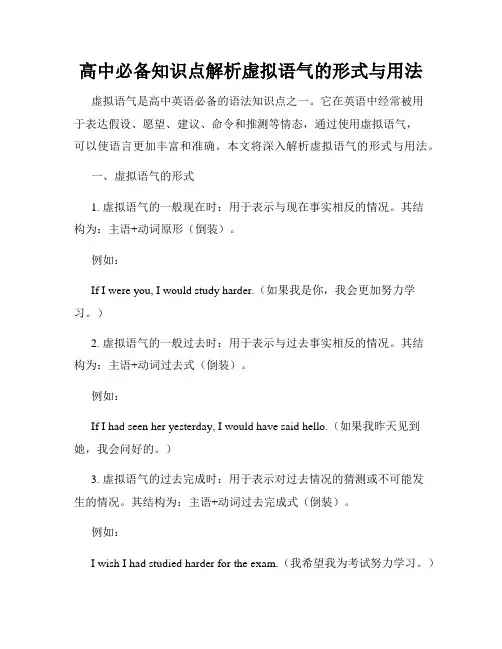
高中必备知识点解析虚拟语气的形式与用法虚拟语气是高中英语必备的语法知识点之一。
它在英语中经常被用于表达假设、愿望、建议、命令和推测等情态,通过使用虚拟语气,可以使语言更加丰富和准确。
本文将深入解析虚拟语气的形式与用法。
一、虚拟语气的形式1. 虚拟语气的一般现在时:用于表示与现在事实相反的情况。
其结构为:主语+动词原形(倒装)。
例如:If I were you, I would study harder.(如果我是你,我会更加努力学习。
)2. 虚拟语气的一般过去时:用于表示与过去事实相反的情况。
其结构为:主语+动词过去式(倒装)。
例如:If I had seen her yesterday, I would have said hello.(如果我昨天见到她,我会问好的。
)3. 虚拟语气的过去完成时:用于表示对过去情况的猜测或不可能发生的情况。
其结构为:主语+动词过去完成式(倒装)。
例如:I wish I had studied harder for the exam.(我希望我为考试努力学习。
)二、虚拟语气的用法1. 表达假设与条件:If I were you, I would travel around the world.(如果我是你,我会环游世界。
)I wish I had a million dollars.(我希望我有一百万美元。
)2. 表达愿望与建议:I wish you would stop smoking.(我希望你戒烟。
)It's important that she arrive on time.(她按时到达很重要。
)3. 表达命令与要求:The teacher ordered that the students be quiet.(老师要求学生们保持安静。
)She insisted that he leave immediately.(她坚持要他立刻离开。
)4. 表达推测与猜测:He looks as if he were sick.(他看起来像是生病了。

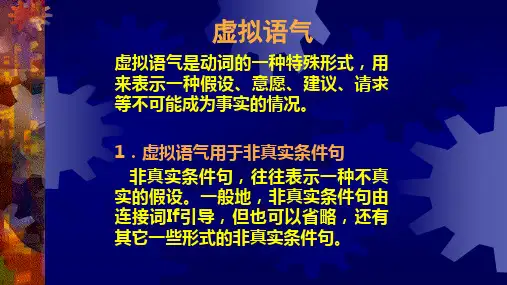
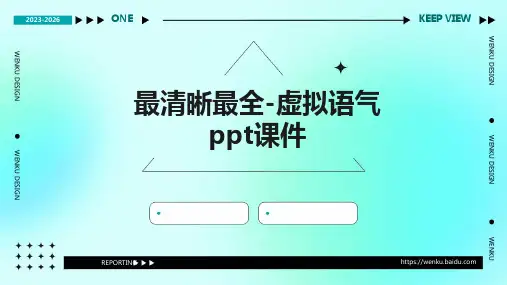
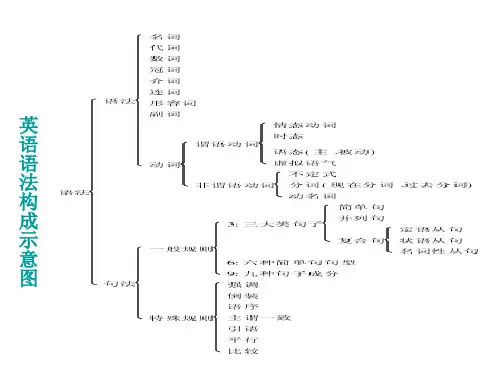
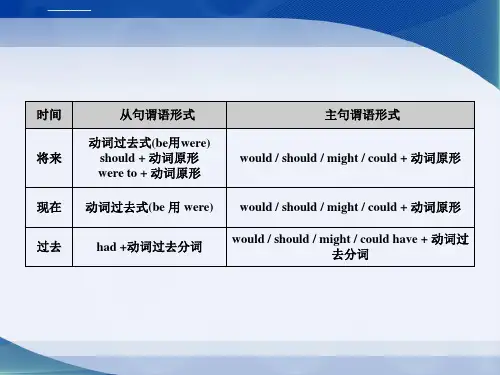
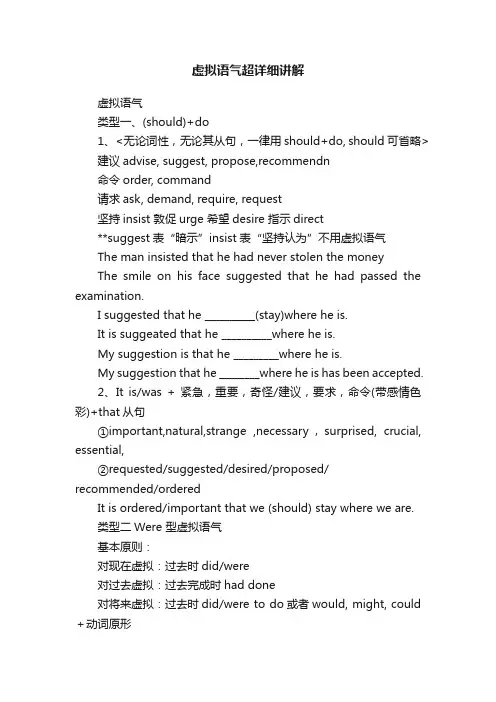
虚拟语气超详细讲解虚拟语气类型一、(should)+do1、<无论词性,无论其从句,一律用should+do, should可省略>建议advise, suggest, propose,recommendn命令order, command请求ask, demand, require, request坚持insist 敦促urge 希望desire 指示direct**suggest表“暗示”insist表“坚持认为”不用虚拟语气The man insisted that he had never stolen the moneyThe smile on his face suggested that he had passed the examination.I suggested that he __________(stay)where he is.It is suggeated that he __________where he is.My suggestion is that he _________where he is.My suggestion that he ________where he is has been accepted.2、It is/was + 紧急,重要,奇怪/建议,要求,命令(带感情色彩)+that从句①important,natural,strange ,necessary,surprised, crucial, essential,②requested/suggested/desired/pro posed/ recommended/orderedIt is ordered/important that we (should) stay where we are.类型二Were 型虚拟语气基本原则:对现在虚拟:过去时did/were对过去虚拟:过去完成时had done对将来虚拟:过去时did/were to do或者would, might, could +动词原形1. if 条件句中的虚拟时间从句谓语形式主句谓语形式将来动词过去式(be用were)should + 动词原形were to + 动词原形would / should / might / could + 动词原形现在动词过去式(be 用were) would / should / might / could + 动词原形过去had +动词过去分词would / should / might / could have + 动词过去分词1.1 与现在事实不一致,其句型为:If +主语+did ,主语+should (could, would, 或might )+do .If I were you, I would study hard. (可倒装)If it rained, I would not be here now.1.2 与过去事实不一致,句型为:If +主语+had +done ,主语+should (could, would, 或might )+have +done. If the doctor had come last night, the boy would have been saved. (可倒装)1.3 将来事实不一致,句型为:If should were to 主语++do ,主语+should (could ,would, 或might )+do. If it should rain tomorrow, we would stay at home.(可倒装)If I were to go to the moon one day, I could see it with my own eyes.(可倒装) If you missed the film to night, you would feel sorry.(混合虚拟)难点:①在条件句中如果出现were, had, should 可省去if ,将主语与这些词倒装 Had the doctor come last night , the boy would havesaved.Were I to go to the moon one day , I would see it with my own eyes.Should it rain tomorrow , we would stay at home.②当条件状语从句表示的行为和主句表示的行为所发生的时间不一致时,被称为“错综时间条件句”,常常表现为if+过去虚拟+主句现在虚拟If you had followed my advice, you would be better now.If you had studied hard before, you would be a college student now.2. wish 后面的宾语从句中与现在愿望不一致: 主语+did ; I wish I were you.与过去愿望不一致: 主语+had +done ;I wish I had visited the white House when I was in the states.与未来愿望不一致: 主语+would (could )+do 。
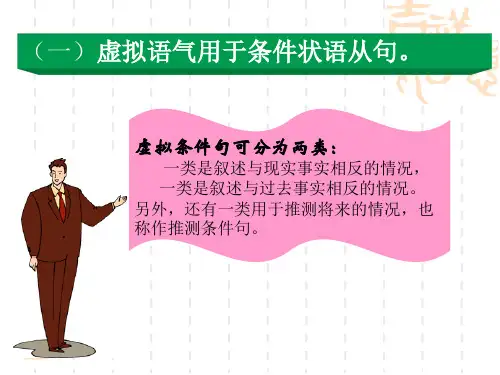
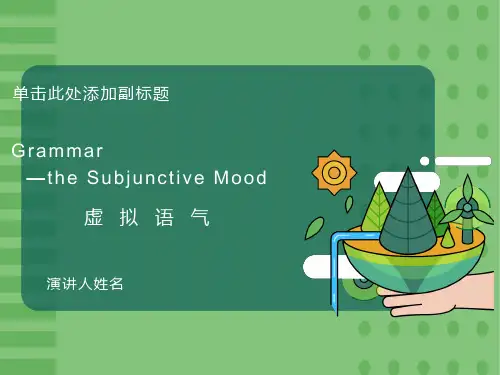
虚拟语气一、考点聚焦1、虚拟语气用于条件状语从句中(1)表示与现在事实相反的假设,条件状语从句中的谓语动词用“过去式(be动词的过去式用were)”,而主句中的谓语动词用“would / should/ could / might + 动词原形”。
如:If I were a boy, I would join the army.If the had time, she should go with you.(2)表示与过去的事实相反,条件状语从句中的谓语动词用过去完成时,主句中的谓语动词则用“would / should / might / could + have +过去分词”。
如:If he had taken my advice, he would have succeeded in the competition.(3)表示与将来事实相反,条件状语从句中的谓语动词一般过去时或should(were to) + 动词原形,而主句中的谓语动词则用would / should/could might + 动词原形。
如;If it were to rain tomorrow, the football match would be put off.(4)当条件状语从句表示的行为和主句表示的行为所发生的时间不一致时,动词的形式要根据它所表示的时间作相应调整。
如:If they had worked hard, they would be very tired.(从句说的是过去,主句指的是现在)Were I a boy, I would join the army.Had he taken my advice, he would have succeeded.Were it not for the expense, I would go to Britain.2、虚拟语气用于名词性从句(1)虚拟语气在宾语从句中的运用。
英语虚拟语气语法总结虚拟语气常常使学习英语的人感到困惑。
它需要我们以想象的方式来表达一种与事实不符的情况或假设。
在这篇文章中,我们将对英语虚拟语气进行总结并提供一些实用的例子。
一、虚拟语气的形式和用法虚拟语气的形式主要有:1. 过去式虚拟:用于表示与现在事实相反的情况。
例如:"If I were rich, I would buy a yacht."(如果我富有,我会买一艘游艇。
)2. 过去完成式虚拟:用于表示与过去事实相反的情况。
例如:"If she had studied harder, she would have passed the exam."(如果她学得更努力,她本来会通过考试的。
)3. 条件句中的虚拟语气:用于表示与现在或将来事实相反的情况。
例如:"If I had more time, I would go on a vacation."(如果我有更多时间,我会去度假。
)4. 愿望虚拟语气:用于表示对目前或过去情况的希望、期待。
例如:"I wish I were taller."(但事实是我并不高。
)二、虚拟语气的用法详解1. 表示虚拟条件的句子虚拟条件句常常由“if”引导,其中包含一个假设性的陈述。
在这种情况下,我们使用过去时态来表示与现在事实相反的情况。
例如:"If Iwere you, I would apologize."(如果我是你,我会道歉。
)这里的“were”是过去式虚拟的一种形式,用来表示与现实情况不符的假设。
2. 表示与过去事实相反的虚拟语气过去完成式虚拟经常出现在假设条件中。
例如:"If she had told him the truth, he wouldn't have been angry."(如果她告诉了他真相,他不会生气。
英语的虚拟语气知识点讲解一、虚拟语气的概念。
虚拟语气是一种特殊的动词形式,表示所说的话不是事实,而是一种假设、愿望、怀疑、推测或与事实相反的情况等。
二、虚拟语气在非真实条件句中的用法。
1. 与现在事实相反。
- 条件从句的谓语动词用一般过去式(be动词一般用were),主句的谓语动词用“should/would/could/might + 动词原形”。
- 例如:If I were you, I would take an umbrella.(实际上我不是你)2. 与过去事实相反。
- 条件从句的谓语动词用“had + 过去分词”,主句的谓语动词用“should/would/could/might+have +过去分词”。
- 例如:If he had taken my advice, he would have passed the exam.(实际上他没听我的建议,也没通过考试)3. 与将来事实相反。
- 条件从句的谓语动词有三种形式:一般过去式、“should+动词原形”、“were to+动词原形”,主句的谓语动词用“should/would/could/might +动词原形”。
- 例如:If it rained/were to rain/should rain tomorrow, we would not go out.三、虚拟语气在宾语从句中的用法。
1. wish后的宾语从句。
- 表示与现在事实相反的愿望,从句谓语动词用一般过去式(be动词用were)。
例如:I wish I were a bird.(实际上我不是鸟)- 表示与过去事实相反的愿望,从句谓语动词用“had+过去分词”。
例如:Iwish I had seen the film yesterday.(实际上昨天没看这部电影)- 表示与将来事实相反的愿望,从句谓语动词用“would/could/might+动词原形”。
例如:I wish I could fly to the moon tomorrow.2. 在表示建议、要求、命令等意义的动词后的宾语从句中(如suggest, advise, demand, require, order等)- 从句谓语动词用“should+动词原形”,should可以省略。